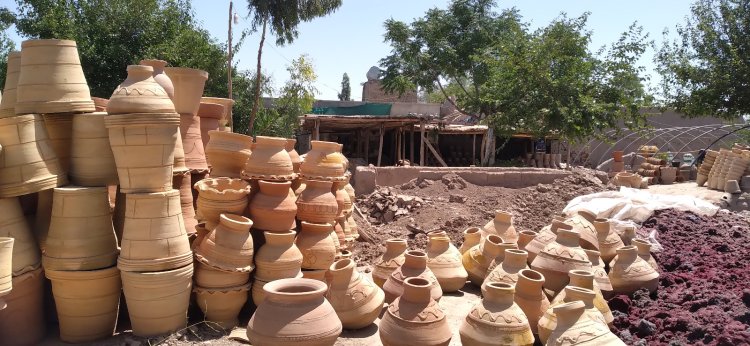Clay and Craft: The Life of an Afghan Tanour Maker

Every morning, as the first rays of the sun appear, in the alley of potters in Jalalabad, Mohammad Ashraf mixes clay and water with his calloused hands and works in his small workshop, continuing the craft of making earthenware and moving forward in his pottery trade.
Mohammad Ashraf, 49, inherited the art of pottery from his father and has supported his family through this craft for many years. He says that through this work, he has not only kept the craft alive but also made it the main source of income for his household.
He says: “I have been a potter for 30 years; this is my father’s profession. Through making tanours and other clay vessels, I have educated my six daughters and supported my family.”
According to him, each tanour costs between 300 to 500 Afghanis, and he earns a sufficient daily income from his work. Ashraf has no sons, and his greatest hope is that all six of his daughters graduate from university and serve society.
He explains: “I have six daughters; four have graduated from university, and two were in 10th and 8th grades when schools were closed. Two studied private medicine, and the other two completed degrees in law and Dari literature. Now they are married, but they still pray for me.”
For Mohammad Ashraf, pottery is not just a source of income; making each clay vessel is a symbol of patience and a meaningful connection with the earth. He only studied up to fifth grade but valued education, ensuring that all his daughters became literate.
He says: “I studied only until fifth grade because of our economic situation, and my wife is illiterate. But I decided from the start that all my daughters would go to school and university. Thanks to God, this wish has been fulfilled, though I am still concerned about the two daughters who could not continue.”
Ashraf, who has spent most of his life mastering pottery, adds that most of his income goes toward his daughters’ education. He notes that thanks to their schooling, his business has grown, and sometimes he even receives orders for clay vessels from other provinces.
He says: “My greatest happiness is seeing all my daughters educated. I am now encouraging the remaining two to continue their studies, and I hope other families also prioritize education for their children.”
At the end of the day, as evening approaches, Mohammad Ashraf gathers his tools, closes the workshop, and heads home—only to return and repeat the same work the next day.
